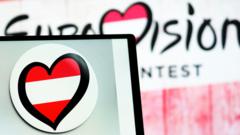Will Dutch Broadcaster Join Eurovision Boycott Over Israel's Participation?

Published: 2025-09-12 12:42:09 | Category: technology
The Netherlands has joined Ireland in declaring a boycott of the Eurovision Song Contest 2026 if Israel is involved, citing severe humanitarian concerns and a lack of press freedom in Gaza. This decision follows a similar stance taken by the Irish broadcaster RTÉ, which has expressed outrage over the ongoing violence in the region. As Eurovision approaches, the implications of these boycotts could significantly impact the event’s landscape and its participants.
Last updated: 14 October 2023 (BST)
Key Takeaways
- The Netherlands' public broadcaster, Avrotros, will boycott Eurovision 2026 if Israel participates.
- Irish broadcaster RTÉ has also stated it will withdraw under similar circumstances.
- Concerns include human suffering in Gaza and restrictions on press freedom.
- Calls for the UK to withdraw have emerged, but the BBC has yet to respond.
- More than 70 former Eurovision contestants have requested a ban on Israel's participation.
Background of the Eurovision Song Contest
The Eurovision Song Contest is an annual international competition in which countries from Europe and beyond submit original songs to compete for the title. It has a rich history, dating back to 1956, and has become known for its flamboyant performances and diverse musical styles. The contest not only showcases musical talent but also serves as a platform for political expression and cultural commentary.
The Current Situation in Gaza
The ongoing conflict in Gaza has led to substantial loss of life and human suffering. Reports indicate that the situation has escalated, resulting in increased international scrutiny and criticism of Israel's actions. As the humanitarian crisis deepens, calls for accountability and intervention from various sectors, including artists and entertainers, have intensified.
Avrotros and RTÉ's Decisions to Boycott
Avrotros, the Dutch public broadcaster, issued a statement reflecting a moral stance in light of the humanitarian crisis. Their decision aligns with RTÉ's earlier declaration, which emphasised that participation in Eurovision under these conditions would be untenable. Both broadcasters highlighted the importance of upholding the values of public broadcasting, including freedom of expression and concern for human rights.
Why the Boycott Matters
The implications of these boycotts are significant. They not only reflect the views of the broadcasters but also resonate with the public sentiment in both countries. The Eurovision Song Contest is a prominent cultural event, and a widespread boycott could pressure organisers to reconsider Israel's participation. Furthermore, it raises questions about the role of cultural events in political discourse and the potential for art to influence social change.
Impacts on Eurovision 2026
As Eurovision 2026 approaches, the decision by Avrotros and RTÉ could have far-reaching effects. The European Broadcasting Union (EBU), which oversees the contest, may face increased pressure from other nations and broadcasters to reconsider Israel's participation. The EBU's response will be crucial in determining the contest's future dynamics and its commitment to inclusivity versus political pressures.
Historical Context: Artistic Expression and Political Statements
Historically, Eurovision has been a platform for artists to express their views on political issues. Previous contests have seen various participants use their performances to address social and humanitarian matters. The current situation marks a notable moment in the contest's history, illustrating the intersection of politics and popular culture.
Calls from Prominent Figures
Irish musician Phil Coulter, known for his contributions to Eurovision, has publicly supported RTÉ's decision and called on the UK to withdraw from the contest if Israel is involved. His remarks highlight a growing sentiment among artists regarding the need for accountability in situations of humanitarian crises. The BBC, as the UK's Eurovision broadcaster, has yet to take a definitive stance on the matter, leaving questions about its future participation.
Public Sentiment and Artistic Responsibility
Coulter’s comments reflect a broader public sentiment in the UK and Ireland, where many individuals are reportedly outraged by the ongoing violence in Gaza. Artists often carry a unique responsibility to use their platforms for advocacy, and the situation poses a challenge for those involved in the music industry regarding their participation in events perceived as politically charged.
The Reaction from Other Countries and Artists
In addition to the actions taken by Avrotros and RTÉ, there has been a notable reaction from various artists and former contestants. A letter signed by over 70 former Eurovision participants called for a ban on Israel's involvement in future contests. This collective action signifies a growing movement among artists to take a stand against perceived injustices and advocate for humanitarian concerns.
What’s Next for Eurovision?
The EBU is expected to make a decision regarding the participation of Israel in Eurovision 2026, amidst this climate of boycotts and protests. The outcome will not only affect the contest's line-up but could also influence public perception and participation in the event. As discussions continue, the power of collective voices in shaping cultural narratives becomes increasingly evident.
Conclusion: The Future of Eurovision Amidst Political Tensions
As Eurovision 2026 approaches, the growing calls for boycotts and the emphasis on humanitarian issues highlight the contest's potential as a platform for political expression. The decisions made by broadcasters and artists will likely shape the future of the event and its role in addressing pressing global issues. The interplay between art and activism is set to take centre stage, raising vital questions about the responsibility of cultural events in times of crisis.
FAQs
What is the Eurovision Song Contest?
The Eurovision Song Contest is an annual international music competition featuring participants from various countries, each performing an original song. It is known for its diverse musical styles and vibrant performances.
Why are Avrotros and RTÉ boycotting Eurovision 2026?
Avrotros and RTÉ have announced a boycott of Eurovision 2026 if Israel participates, citing humanitarian concerns related to the ongoing conflict in Gaza, including human suffering and restrictions on press freedom.
Who has supported the boycott against Israel's participation?
Irish musician Phil Coulter has publicly supported RTÉ's decision to withdraw, along with over 70 former Eurovision contestants who have called for a ban on Israel's involvement in the contest.
What impact could the boycotts have on Eurovision 2026?
The boycotts could significantly influence the event, potentially pressuring the European Broadcasting Union to reconsider Israel's participation and affecting public perception of the contest.
What is the European Broadcasting Union's role in Eurovision?
The European Broadcasting Union (EBU) is the organisation that oversees the Eurovision Song Contest, ensuring the event's organisation, rules, and participant eligibility.



